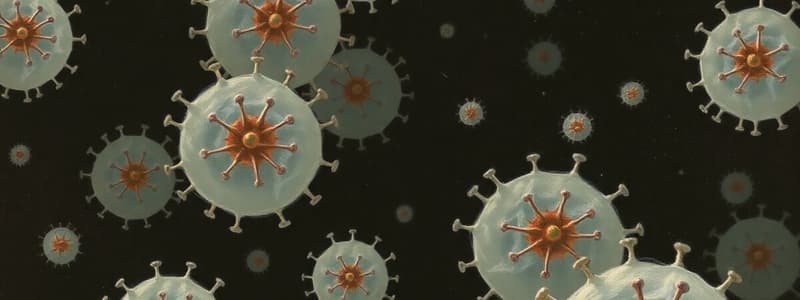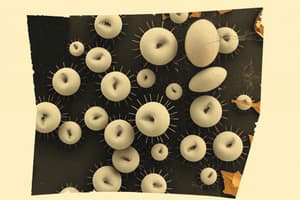Podcast
Questions and Answers
What is the primary function of white blood cells?
What is the primary function of white blood cells?
- To regulate body temperature
- To defend the body against infections (correct)
- To assist in blood clotting
- To transport oxygen throughout the body
Which process refers to the engulfing or consuming of microorganisms by white blood cells?
Which process refers to the engulfing or consuming of microorganisms by white blood cells?
- Toxin neutralization
- Phagocytosis (correct)
- Immune response
- Antibody response
What percentage of our blood is made up of white blood cells?
What percentage of our blood is made up of white blood cells?
- Less than 1% (correct)
- 1%
- 10%
- 5%
What do white blood cells produce to help neutralize toxins from pathogens?
What do white blood cells produce to help neutralize toxins from pathogens?
Which characteristic is true about white blood cells?
Which characteristic is true about white blood cells?
Which of the following statements about white blood cells is incorrect?
Which of the following statements about white blood cells is incorrect?
Which of the following mechanisms does NOT involve white blood cells combating pathogens?
Which of the following mechanisms does NOT involve white blood cells combating pathogens?
What is a major function of antibodies produced by white blood cells?
What is a major function of antibodies produced by white blood cells?
How do antitoxins produced by white blood cells function?
How do antitoxins produced by white blood cells function?
Which feature is common among all white blood cells?
Which feature is common among all white blood cells?
Flashcards
WBC function
WBC function
WBCs defend the body against infection by pathogens.
Phagocytosis
Phagocytosis
WBC engulfing and destroying pathogens.
Antibodies
Antibodies
Proteins produced by WBCs to combat pathogens.
Antitoxins
Antitoxins
Substances that neutralize harmful toxins from pathogens.
Signup and view all the flashcards
WBCs composition <1%
WBCs composition <1%
White blood cells are a minority component of blood.
Signup and view all the flashcards
WBC function
WBC function
WBCs protect against infection by consuming or neutralizing pathogens.
Signup and view all the flashcards
Phagocytosis
Phagocytosis
WBCs engulf and destroy pathogens.
Signup and view all the flashcards
Antibodies
Antibodies
Proteins that latch onto and destroy pathogens.
Signup and view all the flashcards
Antitoxins
Antitoxins
Neutralize toxins from pathogens.
Signup and view all the flashcards
WBC percentage
WBC percentage
White blood cells are less than 1% of blood.
Signup and view all the flashcardsStudy Notes
White Blood Cells
- Make up less than 1% of our blood
- Their role is to defend against infection from bacteria, viruses, or other microorganisms
- They defend against pathogens through various processes
Defense Mechanisms
- Phagocytosis: White blood cells engulf and destroy pathogens
- Antibodies: White blood cells produce antibodies that combine with pathogens to help destroy them.
- Antitoxins: White blood cells produce antitoxins that neutralize toxins produced by other pathogens.
Additional Information
- White blood cells have a nucleus
Studying That Suits You
Use AI to generate personalized quizzes and flashcards to suit your learning preferences.




